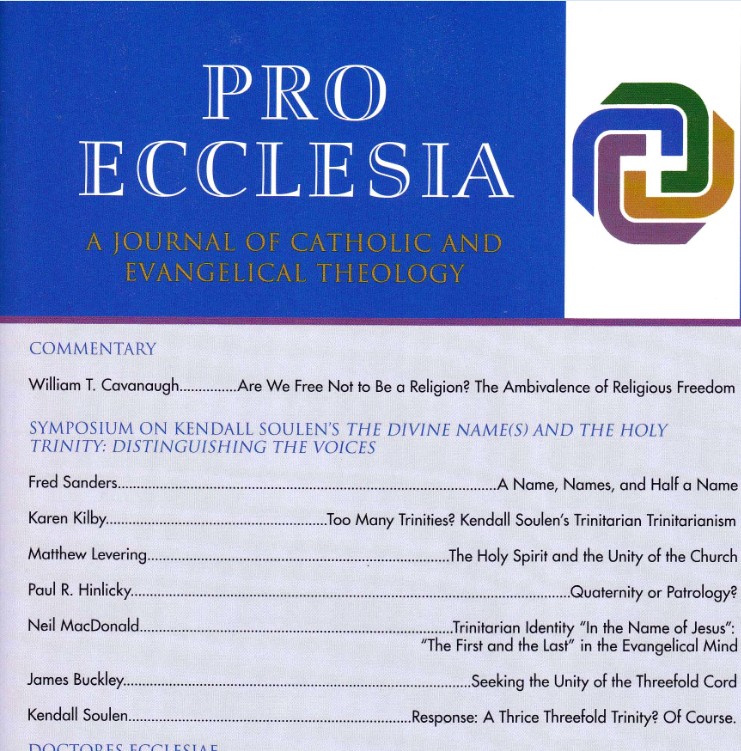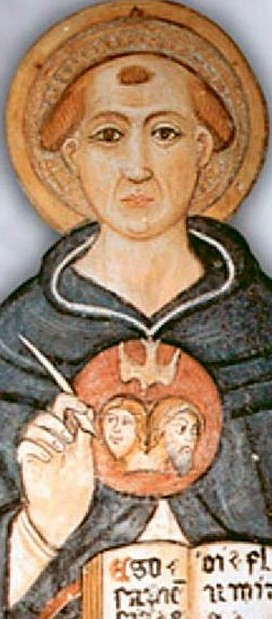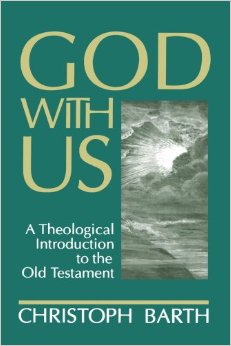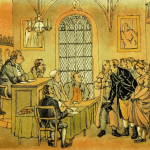Should a Christian pray for a longer life on earth? Never mind admitting that that’s what you want; the question is whether you have any grounds for asking God to give you more years of this life.
In 1869, Methodist theologian William Burt Pope published a sermon for the new year, on the last line of Psalm 39: “O spare me, that I may recover strength, before I go hence, and be no more.”
It’s not what you’d call a cheery line of scripture.
But as W.B. Pope turned the passage over in his mind, read it in the context of the entire psalm, and then considered how this verse could be prayed by Christians, he produced a remarkable sermon. Its virtues are its seriousness, earnestness, and sobriety rather than its cheerfulness or inspiration, yet it is a sermon with a fundamentally joyful outlook and an affirmation that life is fulfilled in the happy enjoyment of God’s blessings. Pope does not conceal from his readers that as the new year dawns he has a strong desire to remain alive; even less does he attempt to conceal this desire from his God. Instead, he meticulously draws out the reasons why it is a good thing to ask God for more days in this life, for more time in this world.
You can read the sermon as originally printed in the Wesleyan-Methodist Magazine of 1869, or read it below. It’s about 4,000 words long; I’ve broken up the paragraphs a little bit, and have added some things like block-quoting and bullet-pointing to make it easier to read online.
A Prayer for “All Men Everywhere”
“O spare me, that I may recover strength, before I go hence, and be no more.” Psalm 39:13
With this prayer David closes a most affecting meditation upon the mystery of human life. Chastened for his sins, and not yet assured of the Divine favour, he muses upon the misery of his own condition, and upon the wretchedness of man generally, under the displeasure of God. To his thought the race is groaning hopelessly and helplessly under a burden too heavy for it to bear. His meditation on God as the Ruler of his life is not this time sweet: it begins in a tone of inexpressible sadness which it scarcely loses to the end; and his appeal to his Maker is almost entirely desponding. Though he restrained his lips before men, before God he is under no restraint.
Lord, Thou hast smitten me for my sins and Thine anger darkens my life. O make me to know my end, and tell me when this time of discipline shall cease, that I may hasten to my rest.
But here as always the Psalmist recovers at the last, and his dirge expires in a supplication that strikes a different note, and goes straight to the heart of all men everywhere.
O spare me! Bring me not to my end; turn from me Thine angry glance and let me yet see good days under the light of Thy countenance before I go hence!
We must throw over this prayer a brighter influence, and give it wider meaning, when, as the children of a better dispensation, we make it our own. We also at this solemn time enter into the presence of Him in whose hands our breath is, and ask Him to give us life. The meaning of the prayer, as it includes us all, its words will tell us, if we carefully weigh them.
*As we are sinners whose lives are forfeited, we ask to be spared to enjoy a new and better life in the Divine favour.
*As we are the regenerate children of God, we ask to be continued in probation, that we may recover our perfect soundness.
*And as we are sojourners in a transitory world, we ask for a little longer space to prepare for our entrance into heaven.
Thus it is a supplication appropriate to every one without exception: it is the cry of the sinner who is making his first appeal to God; it is the Christian’s humble request through every stage of his probationship; and it is the prayer that keeps the end of life in view, and prepares for the close of all.
May the Spirit who helpeth our infirmities teach us all thus to pray!
I. A Prayer for Sinners
O spare me! is the cry of the sinner returning to God. He feels that his life is miserable under the displeasure of his Maker; he prays for the blessedness of the Divine favour; and he cannot ask in vain.
The spirit of David’s prayer is that of one who has been awakened to the conviction that his life has been wasted and is overshadowed by a terrible doom. That conviction, wrought by the Holy Ghost, lies at the root of all religion. By the rebukes that chasten man for iniquity –reproofs of providential visitation, or reproofs of God’s voice in His word– the sinner dead in trespasses and sins is made to feel the burden of his death and to know what it involves.
This is the Christian undertone of David’s ancient lamentation: life is forfeited and darkened by the rebuke of God’s holy anger. But he who learns this bitter lesson from the Spirit’s teaching is pointed to the Cross, and bidden to plead the cause of his condemned soul with humble confidence in the mercy of God in Christ.
And the prayer He inspires is twofold: Spare me! asks, on the one hand, for the withdrawal of that angry glance that blights the life, and, on the other, for the shining of the countenance of God’s returning favour. We may thus distinguish the petitions, as our text does in its true interpretation; but they are really one. And how vast a petition it is!
To be spared, in the full meaning of the word, is to have an infinite penalty remitted; to have the sentence of death cancelled: not that sentence which is written in the members of the body, but that which is written on the soul, –the sentence of eternal death. The sinner flies to God for refuge from the death which is the final and everlasting wages of his sin; from those rebukes which wither the soul for ever; from that anger which endureth through the never-ending night; with no hope of joy to come in the morning. From this, and nothing less than this, the trembling petitioner of this Psalm prays to be delivered. He asks for the forgiveness that cancels the pains of hell.
Nor does he ask in vain. For the sake of Him who in the deepest sense died for us, the utmost iniquity of the sinner may be forgiven, and the life that is all but ended under the cloud of the Divine displeasure may be redeemed from destruction.
But this is only half the prayer: it is very bold, and asks for the full restoration of the joy of life. David’s words strictly mean, Turn away Thine angry look, that my darkened countenance may shine in Thy favour! We may interpret them by the strain which he uttered at a happier time, when the candle of the Lord shone upon him: In Thy favour is life, Thy lovingkindness is letter than life. The strength and joy of existence is the sense of the Divine love. When that blessed secret of energy, happiness, and hope is shed abroad in the heart by the renewing Spirit, then we enjoy the more abundant life that Christ came to impart. Then does the spirit know and understand the unspeakable gift of life.
And for all that God’s assured favour can confer the returning penitent may confidently ask. No matter how far the country from which he comes back, he may plead for the full measure of the joy of his Father’s house both on earth and in heaven. The prayer demands all that God has to give to make His creatures happy. It asks not for pardon to be followed by extinction; it asks not to be blotted at once from the book of doom and the book of life. It dares to expect –and its high daring is inspired by the Spirit– a perfect release from the penalty of the past and a justified future in which that past shall be no more remembered. In the exceeding greatness of God’s mercy in Christ this prayer also shall be granted.
O spare me! is a prayer which, to a certain extent, is answered to every one of us, without our asking. The sinner who never felt his sin or fought for mercy is already spared, because One has been pleading for him while he has been keeping a guilty silence. He whom the Father spared not, but delivered Him up for us all, has hitherto interceded for your life, and therefore you still live. His mercy has until now rejoiced against judgment, and secured for you forbearance. But the mercy that endureth for ever in its reign over the fallen world, and in its issues towards those who accept it, will not be found everlasting by the impenitent. You have been spared hitherto, but there is no assurance that the decree will wait much longer. The Hand that has protected you from the executioner of holy justice will not always shield your unhappy soul.
Begin then, at once, to account the long suffering of God to be salvation, as one apostle bids you, but only, as another says, by remembering that it leadeth to repentance. Ask the Divine Spirit to reveal to you your guilt and your ruin; go with your lost soul before the Giver of pardon and of peace; plead the promises of the covenant of life ratified in the death of Christ; and God will remit your sentence, and give you back tho life which you have forfeited, and give it back to you much more abundantly. But take this added warning to your heart. You have been spared till now only in provisional compassion; the sentence has been suspended, but not reversed; and should you still neglect to make the prayer your own which the Lord is urging for you, He who has spared you yet another year may make this the last of His intercession. Your life will then be darkened and lost for ever.
II. A Prayer for the Forgiven
Taking this prayer precisely as it stands in the Psalm, it is a petition for continuance in life in order that perfect spiritual soundness may be obtained before going hence.
He who has begun the true life of the Spirit in Christ must needs be conscious of a deep desire to redeem the past, so far as that may be. He shares indeed the common instinct that clings to this present existence; but this instinct is sanctified into a generous and healthy desire to undo the effects of past sin, to attain the full standard of excellence, and to become strong to do the Divine will. This gives its warrant to the supplication for continuance in this life in the flesh.
Although the iniquity of the past is fully forgiven, and to the visitation of justice is as though it had not been; although the bent and bias of the nature is renewed by the power of the Spirit; the consequences of the pardoned sin more or less remain, a sad inheritance from sinful youth. The understanding that has been long perverted and darkened, the will that has been enslaved to evil and averse from good, the affections that have been prostituted to vanity, do not suddenly and at once regain their strength unto holiness. Inveterate habits of iniquity, though broken off for ever, leave their effect upon the character, and render necessary the establishment of opposite habits, created by steadfast continuance in well doing.
And what can be more worthy of the converted soul than the desire to live to recover wholly from the effects of the deep rooted disease of sin, and to efface from the most hidden fold of the heart every remembrance of evil? The forgiven transgressor looks back with shame upon his former self; his sin is ever before him, and he remembers with loathing the deeds that God remembers not. His desire is to take a holy vengeance upon the past by making the future one continual contradiction to it. Hence the energy with which he prays to be spared, that he may recover from the effects of his guilty rebellion, and make what reparation he may to his God and himself.
But the prayer has an object still higher than this: it values life and asks its continuance that the full work of sanctifying grace may be wrought on the nature, raising it to perfect soundness. As this is the work of grace, it is also the work of time. The Healer of our souls does not ordinarily deal with our spiritual maladies as He once dealt with our physical ills, making us by a word or a touch perfectly whole. There is a sense in which He can and will do this. But, generally speaking, the Spirit of life within us works by a law. He gives the new principle of life, provides for its nourishment, sets before us the commandment and the pattern of obedience unto holiness, and blesses us in our career to perfection. But the attainment of perfection is still a career.
And although the accepted penitent cannot perish, being found in Christ, but is translated by death to another scene of eternal development, yet it is the secret instinct of the regenerate soul to desire to grow up to the full stature of a man in Christ Jesus, under the influences of grace, and amidst the scenes of probation. Here where his sin abounded he longs that his grace may much more abound. Here in the tabernacle of the once-polluted flesh he desires to attain and reflect the beauty of a consummate holiness. He sets his heart upon the apostle’s triple idea of the perfect life, the sanctification of body, soul and spirit. With his Master’s glorious image before him, and by the side of that image the ideal of his own self made perfect, he asks for life that he may realize both. Whatever may be the transforming power of the vision of Christ in the other world, he feels that the change from glory to glory is the appointed privilege of this life; and that the maturity of the Christian character is the exceeding great reward of religion upon earth. He would reach his spiritual perfection below, and before he begins the higher career of heaven. He would not leave this life and its religious education a babe, or even a young man, but a father in Christ; and hence the ardour of his prayer, Spare me that I may recover strength before I go hence.
Again, the prayer for lengthened days has its justification in the laudable desire to recover strength for the performance, and in the performance, of the Divine will. The remembrance of the guilty past finds its most wholesome bitterness in the thought of a stewardship neglected, and opportunities of doing good gone for ever. The mercy of God has pardoned that great and long-continued wrong, removing a burden that the soul could never otherwise endure. But the time past forfeited makes the rest of our time unspeakably precious. The strong desire, the passion, of the labourer late in the vineyard, is to have the afternoon lengthened, to repair the defect of the morning. To redeem the past entirely, so as to do all the good in the remainder that might have been done, is in the nature of things, and in the order of grace, impossible. And yet the lengthened life may be in some sense a reparation, if not an atonement.
The word of God, while it dwells most impressively, and sometimes in a tone of most terrible warning, upon the neglect of the stewardship of life, does not suffer the accepted convert who has begun to live in earnest to waste his fruitless regrets upon the retrospect. Let it suffice is its most merciful command. It must be left with God to repair what may still be repaired. The most vehement exhortation of Scripture is for the future; and it uses a term that sounds very much like an encouragement to make the remainder of life redeem the past. If our honest desire for lengthened days springs from a determination to employ our best faculties and our every talent in the service of His Church, and in the care of our own personal charge, and for the good of our fellows generally, we may be sure that He approves our prayer, whether He grant it to our hearts’ content or not. Then let us take this spirit with us when we ask to be spared, that we may recover our forfeited place among the agents of the Divine will; that we may recover our strength; the strength of our obedience, the strength of our devotion, the strength of our charity to man.
Thus, brethren, we have sought to find the secret of the prayer put by the Holy Spirit into our lips. It is the humble request to have the full measure of our days vouchsafed that we may rectify the errors of the past, attain the perfection of the religious life, and learn to be strong in duty and charity. Our prayer is already granted to us in so far as we are now alive to offer it. How long it will be granted we know not: it is one of the laws of the providence of God to keep us in ignorance of that. All we have to do is to stamp upon our minds the great reason for which we may ask to live and our life is spared: that we use our time diligently to the glory of God in our own restoration and the discharge of our duty to others.
And let us remember that in the accomplishment of these ends, time is not to be measured altogether by the procession of its hours and days and years. It is God who perfects that which concerneth us, and He can hasten His work before He cuts it short in righteousness. There is no restraint with Him to work by many days or few. He is able to pour His Divine influence into our souls in such measure as shall transcend human computation of time. He can make the work of grace swifter than ever was the effect of sin. He can give strength to overcome old habits faster than they were formed; He can make the growth of the new man more rapid than was the growth of the old; and He can make our feet like hind’s feet in the way of duty, in the pursuit and redemption of neglected obligations. And should He see fit earlier than you would desire to cut short your life –not granting your prayer for the full measure of life,– He will still see to it that you have that deeper desire of the heart from which the prayer sprang. You shall not go hence until you can say like Elijah, It is enough take my life, but without Elijah’s weariness and despondency. You shall be satisfied: though much has been lost, enough shall have been gained to make it an endless blessing to have lived.
III. A Prayer for Sojourners
Our prayer lastly regards life as a sojourn upon earth before going hence, and asks reprieve that the spirit may be strong to take the last journey: a request that is inwrought by the Holy Ghost, and which we may be confident will be granted.
It springs from the deep conviction that life is in its profoundest meaning a pilgrimage to eternity. I am a stranger with Thee, and a sojourner, as all my fathers were: this is the language of the renewed soul alone. He that is born from above knows that he is a wayfarer among men: he has a new citizenship, and, while a stranger with God, has also become a stranger among his brethren. Though still wearing the old form, and speaking the old language, and conversant with the old institutions and habits of life, he knows that a great change has passed upon his relations to the world. But the Christian can adopt this language with a deeper meaning than that which David gave it. He has a clearer disclosure of that pilgrimage unto God to which the sojourning with God leads. He has a clearer revelation of the state in which he will be found when no more seen, of the judgment that he must pass through, and of all that is meant by perfect preparation. Hence it is with a peculiar emphasis and with a more certain assurance that we offer this prayer, and ask to be spared awhile on this side the great hereafter.
The Prayer implies a solemn sense of the preparation that is needful. Spare me, that I may recover strength, before I go hence, expresses the spirit’s anxiety to be strong to endure the judgment of the great day: an ordeal of which the Scripture speaks as if it were coincident with the end of life, as the judgment before the judgment that determines in death the state of every soul. And what is the strength that will fortify us to endure the awful test of the day that will reveal the secrets of all hearts, and assign to every man his lot as his work shall be!
Doubtless the strength that will endure the judgment, is a sure confidence of acceptance through the infinite merits of the atoning sacrifice of Christ. He who is accepted in the Beloved now, and in the consciousness of this departs hence, will most assuredly be accepted of the Beloved, who is the only Judge the soul will ever meet. We look for the mercy of our Lord Jesus Christ unto eternal life; and the assurance of that mercy now is the strength of the pilgrim’s soul. But when the eye is steadily fixed upon the judgment of the great day, and all its inquisition, as the merciful Judge Himself has described it, the uppermost feeling must ever be to make the assurance itself sure. Without holiness no man shall see the Lord, is a declaration that qualifies and guards every exultation of faith in the hope of mercy. To have boldness in the day of judgment, St John assures us, is the prerogative of a perfected love; it is the tranquil confidence of one in whom perfect love hath cast out fear, and who is upon earth what Christ is in heaven.
The prayer, therefore, that shrinks with humble diffidence from the dreadful scrutiny that will disclose every secret, does no disparagement to the infinite provisions of grace when it asks for time to make the issue sure. It has a deep solicitude to be right in a matter of eternal importance. The highest saint, that is, the lowliest believer, seeks with trembling anxiety to be protected from himself; to be saved from the last possibility of self-deception. He has indeed no distrust of the Saviour’s present mercy; no vacillation as to the one final condition of his acceptance; no secret confidence in the virtue of anything he can do, or anything that he can make himself, to give him boldness in the day of judgment. But he can never forget that all the work of preparation must be accomplished in time; that in these outer courts the last stain must be removed and the wedding garment woven and worn; and that the spirit which is to be presented faultless in the other world must be made faultless in this. Hence his never ceasing cry, continued to the very verge of heaven: Spare me, that I may recover strength before I go hence.
But the healthy instinct of the Christian has here its own interpretation of the prayer, and one suggested or permitted by the Holy Ghost. This life of probation is the scene of the spirit’s education for the vision of God and the glory of heaven. And are there not gradations of eternal privilege corresponding to the gradations of opportunity improved in time? Here we have the irrepressible sentiment of our own heart to listen to, and are not without hints in the Word of God to confirm it. The spirit of him to whom the Lord has granted many days wherein to contemplate the glory of His character and emulate it, to exercise his regenerate faculties in profound study of His word, and to work out by grace a finished conformity to His example of self-sacrifice and devotion, will surely be capable of a nearer access and closer vision of God than that of him who is saved as by fire, through the infinite merits of Christ, and goes into the Divine presence with a soul just sprinkled from its guilt. Concerning this the infallible Guide says little, lest our wayward minds should pervert its teaching. But our strong sentiment does not mislead us, or rather the pleading Spirit within does not mislead us, when we covet earnestly tine for riper preparation. With that feeling we may desire life as inestimably precious, and ask of God to spare us that we may enter heaven in the full maturity of spiritual senses well exercised, and trained to the utmost pitch of which our nature is capable for the glory that shall be revealed.
And there is a relation between the seed-time of earth and the harvest of heaven. Saved by the free grace of our Saviour, the same Saviour will render unto every one of us according to his work, dispensing to each his reward –it is His own word– as his labour shall be. With these He will adorn His free gift of eternal mercy. The pilgrim’s preparation, therefore, for his final state includes the abundance of the good deeds, wrought through grace, which going before Him will declare the genuineness of his profession and be the measure of the dispensation of his Saviour’s favour in heaven. It is not therefore an unevangelical prayer –it is rather one of the purest fruits of the indwelling Spirit teaching us what to pray for– when we ask to be spared to lay up treasures in heaven, treasures not heaped up for others but for ourselves; to have many days granted wherein to weave by Divine grace a garment that the moth shall not fret, and to make the utmost preparation that the scanty residue of life will allow for a rich eternity. Our days are lengthened, like Hezekiah’s, that we may not only set our house in order upon earth, but also prepare for ourselves eternal habitations. We need not know how long we have to live to accomplish this. Every added day may do its part. Nor is this desire the only one, or even the strongest, that enters into the request. To be ready for the judgment is the great concern for our fear; to be prepared for the vision of God the noblest incentive to our hope; but the attainment of our great reward is a secret object of solicitude that never need he shut out when we utter our supplication O spare me, that I may recover strength, before I go hence and be no more.
Thus brethren we have been taught by the Holy Spirit a prayer which is always appropriate, which especially befits the beginning of another year, and which adapts itself to every one of us. Let him who has never yet entered among the living ask boldly for the restoration of his forfeited life, to be spent hereafter in the joy of the Divine favour; and his cry shall not be unheard. Let those who have begun the true probation of eternity pray that they may not go hence until they have achieved a perfect health; and this cry also shall most assuredly go up with acceptance. And let us all, beginning another of the few remaining terms of life that separate us from the great futurity, ask for time, and improve the time that is given in the one pursuit of an entire preparation to go hence.















